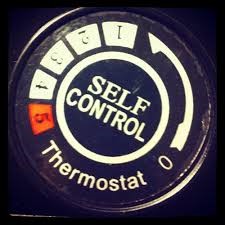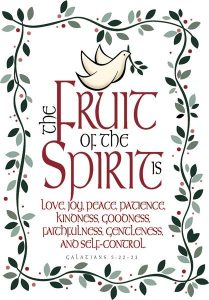Another Year of Choices
By Barbara Dahlgren
 Self-control is a fruit of the Holy Spirit. (Galatians 5:23) The Greek word is “enkrateia” which means not only self-control but self-mastery, self-restraint, and self-governance. Self-control is also used in a list of qualities to be practiced by Christians. (2 Peter 1:5-9) Those failing to practice them are called shortsighted to the point of blindness. So self-control is very valuable in the Christian journey.
Self-control is a fruit of the Holy Spirit. (Galatians 5:23) The Greek word is “enkrateia” which means not only self-control but self-mastery, self-restraint, and self-governance. Self-control is also used in a list of qualities to be practiced by Christians. (2 Peter 1:5-9) Those failing to practice them are called shortsighted to the point of blindness. So self-control is very valuable in the Christian journey.
Self-control is the ability to live within certain restraints. Even if we are within our rights to do something, sometimes it is not wise to do it. (1 Corinthians 6:12) But generally this is not the area of self-control most of us have problems with. More than likely we fail to resist temptations or excesses that feed into our weaknesses, which leads to making our lives or the lives of those around us miserable.
Some in society would have us be free of all restraints. They want us to do our own thing, look out for number one, and “let it all hang out,” so to speak. More than one person has been caught on social media “letting it all hang out” and, believe me, it has not been a pretty sight.
Today we have a binge mentality. We think if a little is good, a lot is better. We want to binge on food, TV, sex, sports, work, spending, collecting grown-up toys, etc. If people want something that isn’t theirs, they just take it. If people don’t like others or a group’s lifestyle, they send hate mail, persecute, or kill them. All of this is done under the umbrella of self-justification.
The Bible cautions us about lack of self-control…
- Uncontrolled lust can lead to fornication or adultery. (Proverbs 6:26-32) Paul tells us the body is not for sexual immorality, but for the Lord. (2 Corinthians 6:13)
- Uncontrolled spending can lead to squandered lives or even poverty. (Proverbs 21:20)
- Uncontrolled ambition may bring money but not understanding. (Proverbs 23:4)
- Uncontrolled love of money can lead to trusting riches instead of God. (1 Timothy 6:9-10, 17-19)
- Uncontrolled drinking leads to doing things we wish we hadn’t done. (Proverbs 23:29-35)
- Uncontrolled anger will have others view us as foolish. (Proverbs 29:11)
- Uncontrolled coveting or wanting what we don’t have can lead to wars. (James 4:1-3)
- Uncontrolled tongues can do irreparable damage to others. (James 3:6-10)
Proverbs 25:28 says, “Whoever has no rule over his own spirit is like a city broken down, without walls.” Building and maintaining walls was pretty important in Old Testament times. Walls were a source of strength and protection. Cities with broken walls had shameful reputations and were easy for others to conquer. Do we see a parallel here with people who lack self-control?
2 Timothy 3:1-5 gives us a long list of what leads to a nation’s downfall. Nestled in the middle of all of them is “without self-control.” When Paul presented the gospel to Felix, a Roman governor, he chose to emphasize righteousness and self-control. (Acts 24:25) Historians think lack of self-control, drunkenness, orgies, and an “anything goes” mentality led to the fall of the Roman Empire.
Titus did not have it easy as a young pastor on the isle of Crete. Crete was well known as the first century party place with residents considered to be liars, evil beasts, and lazy gluttons. (Titus 1:12) So Paul wrote to Titus and encouraged him to teach self-control to his new converts.
- Teach elders to be men known for their self-control. (Titus 1:8)
- Teach older men to be sober and temperate. (Titus 2:1)
- Teach older women to tell the truth, not drink too much wine, be discreet and chaste. (Titus 2:3-5)
- Teach young men to have integrity, reverence, and be incorruptible. (Titus 2:6-8)
- Teach bond servants not to answer back or pilfer. (Titus 2:9)
- Teach all Christians to say, “No!” to ungodliness and worldly passions. (Titus 2:11-14)
In other words, they all needed to learn restraint or self-control – and so do we!
In this Titus passage, Paul also mentions God’s redeeming grace. Well, this same grace that redeems us can reform us if we yield to the God who provides it. Yielding to God is essential because the self-control we are discussing is not human willpower. Godly self-control is power from God that enables us to govern our lives.
Another meaning of the Greek root word “krateia” or “kratos” is strength. The inner strength we need to exercise in “enkrateia” or self-control comes from God. As we draw close to God, He infuses us with that little something extra we need to exercise godly self-control.
Consider this… It would be so much easier if God would just control us as we yield to Him, but that’s not how God works. God will guide us and help us, but He won’t control us. He gives us free moral agency. However, when we yield to God, draw near to Him, and make Him a priority in our lives, He gives us what we need to exercise self-control.

Suggestions for practicing this choice…
Flee temptation. If someone is looking for a gun fight with you, then get the hell out of Dodge.
Better yet, if you have a certain weakness, don’t go where they will be tested. Don’t go to Baskin Robbins if you can eat a whole ice cream cake by yourself. Don’t go to happy hour for the free snacks if you have a tendency to drink too much. Just – don’t – go – there!!!
Replace your temptations by pursuing righteousness, faith, love, and peace. (2 Timothy 2:22) Counteract wrong desires by submitting to God and drawing near to Him. (James 4:7-9) Ask God for help!
Be kind to everyone but realize who you hang around with makes a difference. (1 Corinthians 15:33) Develop close, personal relationships with the spiritually minded. (Ecclesiastes 4:10)
We are not perfect. We all slip and fall. Realize God loves you… so if you fall – pick yourself up, dust yourself off, and start all over again. Hmmm??? Someone should write a song about that!

